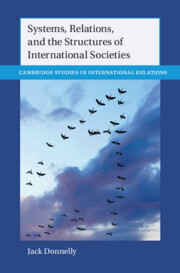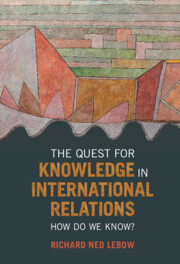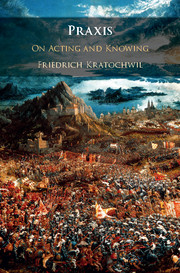Systems, Relations, and the Structures of International Societies
Inspired by recent work in evolutionary, developmental, and systems biology, Systems, Relations, and the Structures of International Societies sketches a robust conception of systems that grounds a new conception of levels (of organization, not merely analysis). Understanding international systems as multi-level multi-actor complex adaptive systems allows explanations of important features of the world that are inaccessible to dominant causal and rationalist explanatory strategies. It also develops a comprehensive critique of IR's dominant conception of systems and structures (narrow, rigid, and unfruitful); presents a novel conception of the interrelationship of the social production of continuities and the social production of change; and sketches models of spatio-political structure that cast new light on the development of international systems, including a distinctive account of the nature of globalization.
- Draws on work on mechanisms, processes, and model-based explanations in the contemporary life sciences to emphasize the differences between 'causal effects' and 'systems effects' explanations
- Comprehensively critiques IR's dominant Waltzian structural conception of systems, allowing us to see systems approaches as parts of a pluralistic discipline (rather than just a narrow approach tendentiously related to realism)
- Demonstrates how a relational systemic perspective can be applied to generate new kinds of understandings of new areas of international relations, and to generate mid-level models that can illuminate both historical and contemporary international systems
Reviews & endorsements
'In a world marked by cascades of ever more complex interdependence, Jack Donnelly persuasively argues that differentiation, not anarchy, should be central to understanding world order. This book is a masterpiece, melding theoretical innovation with broad historical scope.' Daniel H. Deudney, Professor of Political Science, Johns Hopkins University
'At last: a book about international societies as a genus, a book that starts with wholes as parts of wholes, a book that makes sense of levels and layers, a book that fearlessly dispatches Waltz's structuralism for good. A relentlessly systematic, dauntingly detailed book for the ages.' Nicholas Onuf, Professor Emeritus, Florida International University
Product details
October 2023Adobe eBook Reader
9781009355216
0 pages
This ISBN is for an eBook version which is distributed on our behalf by a third party.
Table of Contents
- Part I. Systems, Relations, Levels, and Explanations: Foundations For Systemic/Relational IR:
- 1. Systems and relations
- 2. Complex adaptive systems
- 3. From levels of analysis to levels of organization
- 4. Systems, causes, and theory: explanatory pluralism in IR
- Part II. Waltzian Structural Theory: A Post-Mortem:
- 5. Structural theory
- 6. Anarchy
- 7. The tripartite conception of structure
- 8. Functional differentiation and distribution of capabilities
- 9. Ordering principles
- Part III. Systems, Relations, and Processes: Reframing Systemic International Theory
- Section A. Differentiation and Continuous (Trans)Formation:
- 10. Relations, processes, and systems
- 11. Multiple dimensions of differentiation in assembled international systems
- 12. Continuous (trans)formation: producing social continuity and social change
- 13. Life sciences and social sciences: co-evolving complex adaptive systems
- Section B. Four Excursions in Relational/Systemic IR:
- 14. Normative-institutional differentiation
- 15. Vertical differentiation: stratification and hierarchy in international systems
- 16. Levels, centers, and peripheries: spatio-political structures
- 17. Continuous (trans)formation of eurocentric political systems (c. 1225 – c. 2025)
- 18. Afterword: multiple approaches to multidimensional systems of relations.









